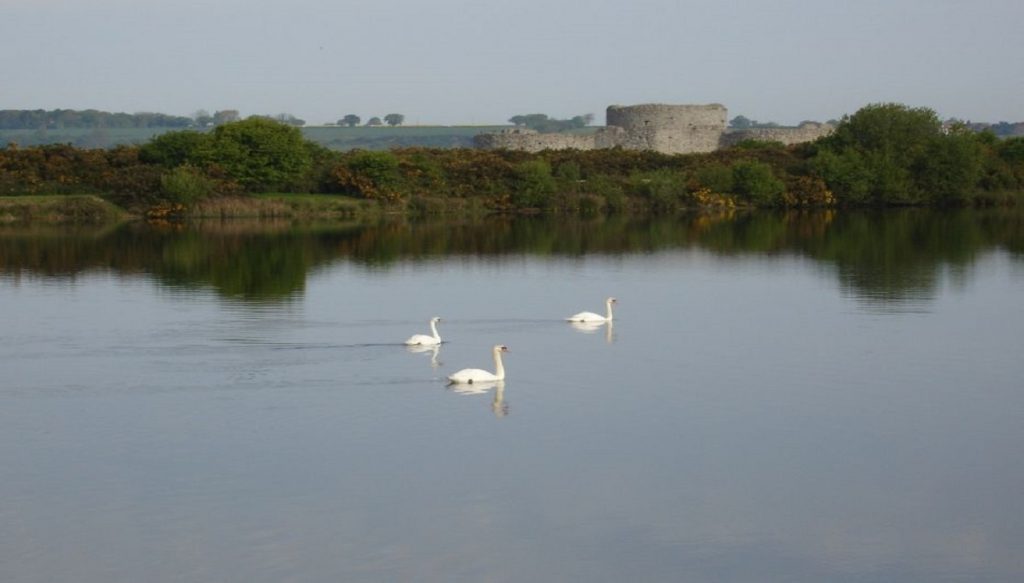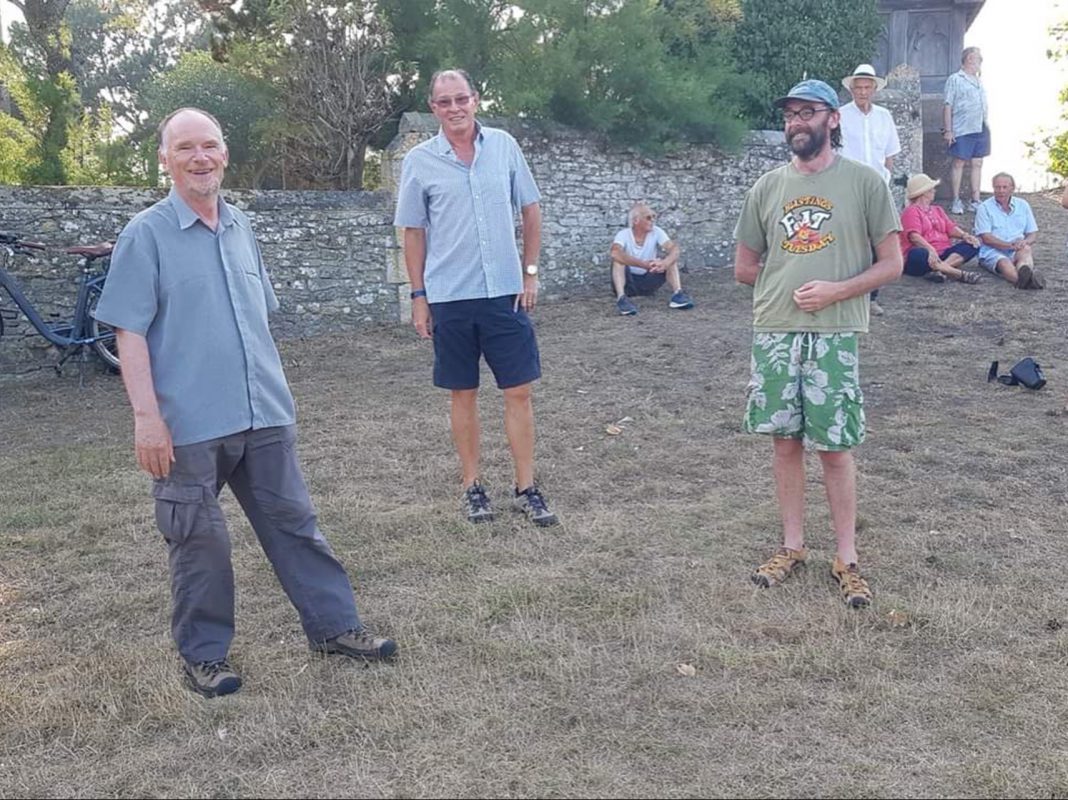On Tuesday, August 11 a group of more than 45 socially distancing people met on the field next to the Church of the Holy Spirit in Rye Harbour to object to plans for 24 hour operation at a nearby industrial site .
John Hornig, one of the instigators of the village action group, spoke first and gave a detailed update of what has happened in the ten days since the initial meeting including an online petition has been set up which has over 700 signatures and is ever-growing.
People had been encouraged to object to the Long Rake Spar (LRS) planning permission proposals to extend the site area, bringing it very near to the church and the Mary Stanford Memorial; to increase the amount of floodlighting; to greatly increase the number of allowable lorry movements, and to extend working hours (and the concomitant noise nuisance) to 24 hours a day.
On Rother District Council’s planning portal more than 160 objections to these proposals have been lodged and there has been good media coverage including BBC South East Today on Sunday evening, and the following morning John spoke to Radio Sussex – and Icklesham’s parish council (which covers Rye Harbour) met on August 10 once again to discuss these proposals in the light of the strength of opposition in the village.
Councillors were horrified to hear of the breaching by LRS of existing conditions and agreed that the company must adhere to their current restrictions. The parish council voted to oppose the current planning application as they are a formal consultee and this carries weight when it is reviewed by RDC’s planning committee.

Dr Barry Yates, manager of the nature reserve at Rye Harbour, spoke next. He talked about the longstanding balance between industry, the village and wildlife and the conflicts that from time to time arise. He informed the meeting that Sussex Wildlife Trust is opposed to 24 hour lighting which would adversely affect the bat population and insects in the special protection area adjacent to the LRS’s site and they are also concerned about the level of noise and disruption caused by extending working hours.
Andrew Whitaker, a resident in the Harbour, then gave us some background information about the company. He had discovered that there was a considerable history of retrospective planning applications by the company in the past. No-one found this surprising.
Keith Glazier, leader of East Sussex County Council, and a local county councillor said that Rye Harbour was in a better state now than it had ever been and he was concerned about the 10 jobs at LRS – but it was pointed out that the 400,000 visitors a year who come to the nature reserve create far more jobs than LRS ever would.
He was certainly concerned about jobs, but it was pointed out that the objections are not related to shrinking the site, nor impacting their currently consented operations. Long Rake spar confirmed that those recently working on the night shift are now working on the day shift.
Regular overnight floodlit work
Kenny Dean, representative for LRS, told the group that there had been no work going on at night for the last week and there were no plans to move lorries at night in the future. This was met with a great deal of scepticism by villagers. He said that Rother District Council had given permission to work outside permitted hours during the Covid-19 situation.
It was reported in the meeting that over recent months there had regularly been floodlit work going on from 4am until 2am the next day. There followed some heated discussion from those present, revealing the intense feelings that the villagers and those who live in surrounding areas have to these proposed extensions to working practices and to extending the area of work.
Rother District Councillor Rev Howard Norton from Rye and Winchelsea ward was in attendance and was supportive of the group.
The LRS representative announced that some of the planning applications have been amended making some of the ambiguous points more clear-cut, but it is plain that people want to know if the company will listen to the concerns of the local people and visitors and stick to their permitted current working conditions.
Dr Barry Yates said after the meeting, “I was very pleased with positive nature of the meeting. None of us want to see job losses and we all want to work alongside the industries in the Harbour but the noise and lighting we have experienced over the last couple of months has been unacceptable.’
Image Credits: Rye Bay Harbour resident , Rye Harbour Nature Reserve .




As reported in Rye News September 14th 2017 (in response to concerns about losing the”wildness” of the Rye Harbour Nature Reserve) Sussex Wildlife Trust stated that their “aim not being to increase the number of visitors to the Nature Reserve” and quoted a figure of 334,469 annual visitors. The number being quoted in the report above is now 400,000. So already there has been an increase or an anticipated increase of almost 20% before the new building has even opened. The Nature Reserve is a wonderful place but the increased traffic associated with visitors causes significant bottle necks and impacts on the quality of life of Rye Harbour residents.
Desiree is so right, the council told us not so long ago, no more developments at Rye harbour until the road improvements are put in, so what do they do renege on their promises,and allow the wild life centre to be built, with so much money given to this project,money should have been put aside for the road improvements, so they get away with no contributions to an upgrade,but other firms are going to be asked to contribute to improving the road, with the majority of the extra traffic going to the centre, some people may say it stinks,and i must agree.
Rye Harbour has been a complicated mix of wonderful ecology, tourism and industry for years: I remember walking from Rye with my parents in the 60s, enthralled by the the scary industrial machinery chugging away – I think it was the great ‘shingle grader’ of Hall & Co.? Although I’m sure local historians will put me right. Then in 1970 came the nature reserve, about to be re-incarnated with the lovely new building. I’m not sure when the growth of the industrial estates took place, but they now house many businesses and provide loads of jobs for local people. I have always thought that this adds to the character of Rye enabling it to stay as a ‘working town’ rather than just preserved in aspic.
So can a rather jolly mix of industry, tourism and nature that makes Rye Harbour so successful (it maintains two rather good pubs, a decent shop and various cafes and bijou art gallery) continue? Yep, course it can. It sounds like the company rep at the meeting has recognised there have been a few errors but they want to get on with the community: give them a chance and see what happens.
In the Village we accepted the development of the LRS site with the approved plans and conditions in 2018.
But what LRS has done is ignored the planning approval etc. , built the tall building bigger, fitted translucent panels on the cladding on all elevations not approved, installed floodlighting on the buildings and poles around the site, planning condition states no external lighting, increased the external storage area, built an office type building next to building 4, both of these not approved.
LRS now want to have 24hour working and have tried it since June without approval including the external lighting and movement of onsite traffic and materials and also want to increase lorries movement from the wharf to their site 100%, 250 movements within a day.
Noise created by 24 hour working etc. is just not acceptable as the “trial” confirmed being so close to the village and has kept people awake at night, and the effects on wildlife etc.
The road junction at the Brede bridge and the A259 will get even more congested and should also be taken into account. This application just cannot be allowed
It looks like Roy Roberts is correct. The tallest building on the site (the one that can be seen for miles around, including the beach) appears to be considerably larger than consented.
The model from the 2018 amendment shows the largest building (building 1) to be 15.209 m wide when viewed from the East. 2018 drawing here – check the East Elevation:
https://planweb01.rother.gov.uk/OcellaWeb/viewDocument?file=dv_pl_files%5CRR_2017_2541_P%5CRR_2017_2541_P-M27_2.pdf&module=pl
The actual building, if the drawing from Long Rake Spar’s current planning application is accurate, is significantly wider. Eyeballing the latest drawing I’d suggest the same dimension (East Elevation) has been built at around 22m – about 30% bigger.
The 2020 drawing is here, again, check the East Elevation:
http://planweb01.rother.gov.uk/OcellaWeb/viewDocument?file=dv_pl_files%5CRR_2020_1044_P%5C4330-220+-+General+Arrangement.pdf&module=pl
Regarding traffic, congestion and parking related to the new nature reserve…Gosh, a 20% increase in projected visitors to the tiny village of Rye Harbour [some 400 residents] thanks to the new nature reserve building, cafe, and outreach for visitors? That looks like 1,000 visitors per resident! Not sure what the capacity for the free public car park is but 400,00 visitors [the estimate so far, anyway] will be arriving in a lot of cars. Not coaches, I guess; the car park has a height restriction. Long-suffering residents of course already have the ongoing battle to find parking themselves when the village is inundated with tourists [not yet 400,00 maybe, phew!].
As things stand now, as per discussion here, etc., traffic in and out of the village is very problematic and dangerous for villagers crossing Harbour Road, especially the elderly and kids, as well as cyclists. In addition, it is often hard for the public bus that services Rye Harbour to execute the essential turn around at the end of Harbour Road in the designated turning circle thanks to inconsiderate tourist parking. As for negotiating what can only be described as actual traffic jams over the bridge and in the village on Harbour Road, bus drivers need nerves of steel and the patience of Job. Thanks to them for the essential job they do.
So, with 400,00 visitors expected, can the public please be reminded about the Sussex Wildlife Trust plan to control what is surely going to be a hugely increased traffic menace into and out of tiny Rye Harbour? Also, can we be reminded what their budget is for their solutions to inevitable traffic and parking problems to which thousands of additional reserve visitors will be contributing? One more thing, what is the Trust plan to alleviate the traffic noise and air pollution for Rye Harbour villagers?
I am confident that any organisation devoted to the well-being and preservation of wild life will be equally concerned about the well-being and quality of life experienced by people whose domestic habitats co-exist in close proximity to their nature reserves, especially those that may eventually be re-configured as public tourist attractions.
Congratulations Diane Mueller on a succient summary of the problems being encountered by the villagers of Rye Harbour. The present situation is already problematic. Camber has similar problems and the traffic almost backing up to the A21 on one hot day meant a traffic hold up in getting out of Rye for at least an hour!!
I do not know if the Wharf and Martello companies could make a large tract of land available for parking along Harbour road outside the village?! Or even in Rye and then people could walk or cycle or travel in their disability buggies down to the village. Safely negotiating the Junction with the A259 and Harbour Road with people friendly traffic lights!! The numbers of cars in the village are an impossibility for normal life.